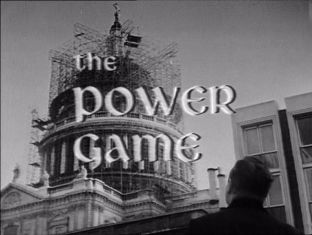

Tuesday 25 February 1969
”Special Envoy: Standard Practice” Writer Raymond Bowers Director Robert Tronson.
“It doesn’t suit me to have a fading Minister ready to blow up…and blowing me up with him!” Sir John Wilder.
Late 1960’s Cold War politics provide the backdrop for a confrontation of Shakespearean proportions as Wilder draws Lord Bligh’s son into conflict with the weakened Minister.
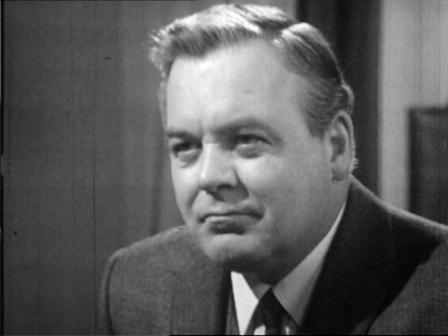
In this episode, Henderson leaves a large expense claim for Wilder to sign, but Lincoln Dowling (Michael Jayston) ensures that Caswell Bligh (Clifford Evans) sees the claim. When Wilder refuses to say who Don was entertaining, Bligh says he obviously doesn’t know what Henderson is doing and demands that Wilder sack him.
When Bligh learns that Don and Ken Bligh have been trying to set up a road-building contract with the Albanian government, Caswell takes charge of the negotiations, determined to cut both Ken and Wilder out of the deal .
Peter Barkworth returns in the first of two Guest Appearances as the son who has not spoken to Lord Bligh for two years. .
There are tragic undertones to the story. His health failing, Caswell Bligh shows regret. After sarcastically asking whether Wilder is signing Henderson’s expense claim as a birthday present Bligh thinks of Ken, musing,” Last Tuesday was his birthday.. And Wednesday was mine..In happier days I agreed that it was the one thing he’d always be ahead of me”. But he still can’t resist trying to cut his son out of the building consortium he’s spent months setting up. As Wilder tells Bligh, “To see him standing on his own two feet would knock you off your own!”
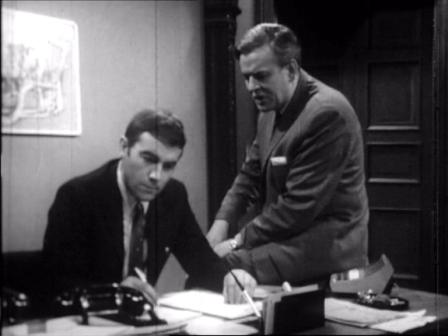
Don Henderson (Jack Watling)needles Lincoln Dowling (Michael Jayston) with unintended consequences
Raymond Bowers sets the story up like a mystery with a languid opening scene in which Don Henderson and Kenneth Bligh survey the aftermath of a lavish meal in an Albanian restaurant in Soho, debate the wiles of working girls and divide up the bill. The conflict between Don Henderson and Lincoln Dowling, ( which Bowers introduced in “Without Prejudice”) erupts once more with Dowling telling Henderson that Lord Bligh has questioned Henderson’s unofficial status within the Foreign Office and wants to know what he’s doing. Ironically, Henderson’s needling of Dowling in reminiscent of his sniping against Ken Bligh in the first series of “The Power Game”, but Dowling is a more credible opponent. He distracts Wilder’s secretary Jill (Deborah Grant) and ensures that Henderson’s expense claim – intended for Wilder’s eyes – finds its way to Caswell Bligh.
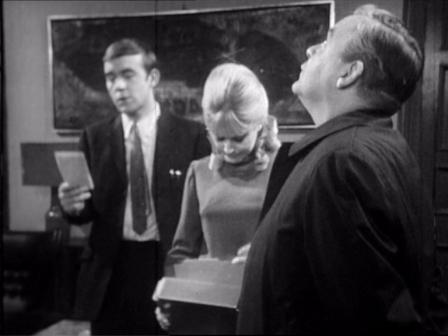
Jill (Deborah Grant) searches for Don's expense claime but Wilder (Patrick Wymark) suspects it has found its way up to Lord Bligh's office
Bligh uses the expense claim as a weapon against Wilder, telling him the Prime Minister wants Henderson’s head.. When Wilder incredulously asks if the Prime Minister has even heard of Henderson, Bligh attempts to recover his ground, demanding, “You concede that where affairs of state are concerned Henderson is insignificant?”
Wilder replies that, “Henderson is unlikely to engage the Prime Minister’s interest, whatever he does. None of the staff are.” At which point Bligh shifts his ground again. “Downing Street wants the Civil Service to cut expenditure.” Henderson has submitted a restaurant bill for ten totalling £230 (about £2,600 in today’s money). What’s worse, “He obviously didn’t have the guts to go the whole hog, so he’s only claiming £115” (about £1,500) and then to explain the incomprehensible fact that that the bill is more – much more- he adds ‘balance met by private source’.”
Suddenly, the furious Bligh falters as the sound of a beating heart is laid over the soundtrack
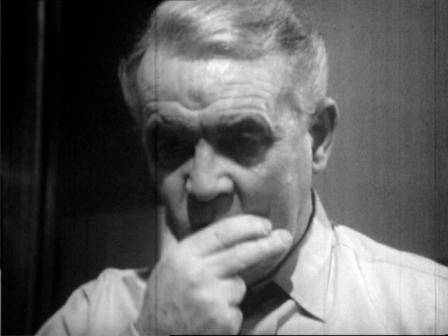
Clifford Evans is disturbingly effective as the disorientated Bligh, struggling to retain his composure: “I’m complaining – John –about a man who adds £50 onto an expense claim – and I quote ‘added expenses £50’ - here in a place where..you know.. you have to fill in five or six forms – to get a ninepenny ballpoint…” Wilder watches intently, no longer in a mood to argue. When Wilder later meets with Kenneth Bligh, he counsels him to seek advice from the family Doctor about Caswell’s health - warning him not to push his father too far. Just in case it seems that Wilder has suddenly become charitable, he makes it clear that he doesn’t want to be dragged down by a “fading Minister”.
But Ken is more interested in getting Wilder to sign off Don’s expense claim. They have spent three months of travel and negotiation with the Albanians and Ken needs to cash in. Normally, Bligh would have to know, but Ken suggests that “My father cannot express a Ministerial opinion about an enterprise in which his son is privately engaged, so he’s left the matter entirely to you.” Wilder, more realistically replies that his father would say Ken’s firm is too small, unsuccessful and badly managed to take part in such a risky enterprise. For Ken, the importance of the expense claim is to convince potential partners that he has the blessing of the Foreign Office.
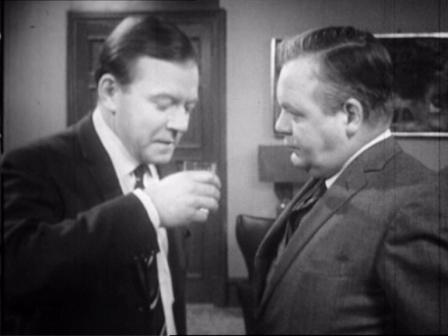
Ken Bligh (Peter Barkworth) says he's stopped morning drinking, but soon finds the strain of his meeting with Wilder too much
We later learn that Don has been working on Wilder’s behalf to secure the road-building contract in communist Albania.
In the real world, the People’s Socialist Republic of Albania had been in dispute with the United Kingdom since a British ship was sunk by Albanian mines in the Channel of Corfu in 1946. Albania had failed to pay the £844,000 awarded by the International Court of Justice and the UK cut off diplomatic relations.
However, Albania had become isolated from post-Stalinist Russia and had withdrawn from the Warsaw Pact following the Russian invasion of Czechslovakia in August 1968. Too hardline communist to cosy up to the West, Albania had looked to Communist China for support.
In the story, Wilder believes that China might pay off the fine on behalf of Albania. And that would make it possible for a British consortium to build roads in Albania, backed by the British Government. Wilder foresaw the need for a road after the Soviet invasion of Czechoslovakia. With Albania isolated from Russia they might need to call on Yugoslavian tanks “the next time the Kremlin went crazy!” (remember that road construction in Yugoslavia was vetoed by the Americans in “Without Prejudice” because you can move tanks on a highway).
The only part Wilder claims he didn’t foresee was Don using Kenneth Bligh to establish relations with the Albanians. But Henderson is not so sure; “Come on, John. You warned me none of the big boys would be so ill informed as to let themselves be used as bait in Albania. That spells Kenneth.”
Ken’s firm is too small to fulfil the contract on its own, but Don is putting together a consortium led by Bewdley and Son..
Ken has arranged a meeting between Wilder and Mejulik (Wolfe Morris) the Albanian commercial envoy in Paris, who has entered the country on false papers.
Wilder instructs Dowling to get him all figures on Britain’s trade dealings with Albania before 1946. Wilder has told Ken that Dowling, “is in some ways my most valuable instrument here,” and is not surprised when Lord Bligh asks him questions about Albania and a road building consortium,
Scenting success, Bligh tells Wilder he’s already asked for a government guarantee for the consortium and will take over the negotiation with Mejuilk. Wilder warns Bligh that Mejulik may be a “primitive hardline Marxist” but allows himself a sly smile when Bligh says they’re the easiest type to deal with. Later on, he advises Don who is hosting the negotiations, “telephone me immediately when Caswell louses up the deal.”
Ken is shocked when he walks into the Balkan Star restaurant to see Dowling and Caswell already waiting. When Sir James Bewdley (Anthony Woodruff ) enters Caswell immediately lays the ground for cutting Ken out by telling him Government backing is out of the question if the consortium wants “to carry sprats”. Bligh continues to dominate when Mejulik and his interpreter (Peter Hawkins) arrive but when Ken interjects that Bligh has never been to Albania and should “have the brains to leave it to people who have,” a furious Bligh grabs Ken to throw him out and suddenly has a seizure.
The effect is economic but effective – a close-up of Bligh’s shocked face – a pounding heartbeat – the picture blurring into a montage of reflected light and out of focus faces as snatches of conversation blend together.
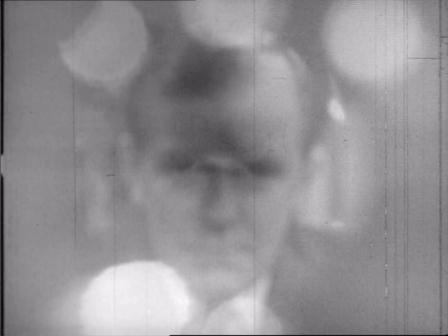
Finally, Bligh recovers, watched closely by Dowling and Henderson as the interpreter asks whether an agreement is to be made between governments or private companies. Bligh says between Governments. “We are in an area of compromise between ideologies. He is not permitted to compromise but I am. There will be no agents fees, and no form of commission to any individuals. “
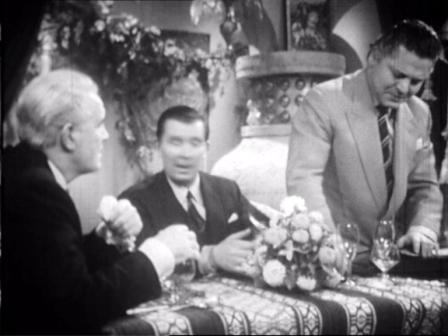
The interpreter (Peter Hawkins) tells Lord Bligh (Clifford Evans) the meeting is over as Mejulik (Wolfe Morris) leaves.
The intepreter relays Mejulik’s response that Bligh has “accurately reflected Karl Marx’s theory.” As Don departs to make his phone call, the interpreter continues that Mejulik,”did not expect to encounter Marxist theory from a capitalist Government.” Mejulik ends the negotiations. As Wilder explains to Bligh later, “Their communism is no different from any other of their systems of government. It’s just something to make the peasants suffer.And the rake-off is, was and always was something for the rulers. Nothing has changed. A king has gone, but only a few more people than usual are enjoying his throne. And the reward for people in positions of state hasn’t changed either Majulik wanted a bribe. An honourable, unexeptionable bribe. Not Marxist practice. Standard practice!”
Wilder suggests that Bligh tells the Prime Minister he has decided to hand negotiations back to the initiator. However, Dowling brings in an intelligence briefing which concludes that the Chinese have been steering the road-building initiative in order to sour British relations with America. “Henderson was nobbled by the Chinese – not they by him – he is of course an amateur.”
As Wilder peers at the briefing, fruitlessly trying to find something that will rescue the deal, Bligh triumphantly tells him he should have taken Dowling into his confidence sooner.
A tightly written episode by Raymond Bowers ensures that the series remains unpredictable by ensuring that Wilder doesn’t win every time. The episode is most memorable for the disturbing scenes where Caswelll Bligh’s heart begins to falter.
At the heart of the episode is a memorandum which Wilder sent the Foreign Secretary, the day after the Soviet invasion of Czechoslovakia. Bligh says that under Civil Service procedure, the memo was diverted to Bligh as Minister. This may seem anachronistic since the first episode was broadcast in January 1969. However, “The Power Game” had started production in August 1968 and this makes it clear that Wilder’s appointment as Special Envoy took place at some time before 20 August 1968 when the invasion began.
Although Wilfred Greatorex enjoyed lengthy script conferences and used technical advisers to get the political details right, Raymond Bowers appears to have prided himself on getting the language and customs correct. Wolfe Morris doesn’t speak a word of English in this episode, and Peter Hawkins (the original voice of The Daleks in Doctor Who and of Captain Pugwash) translates Bligh’s comments back to him. Apparently Hawkins attended the England V Rumania football match on 15 January 1969 and rehearsed his lines, confusing the “away” supporters by shouting “I would like to introduce Lord Bligh” in Albanian at them.
To show that Wilder honours his promises, he ensures that Don and Ken’s expenses are well-covered. He engages in some tricky business with a Swiss banker (played by Preston Lockwood, who was also the banker involved with the pay off to Naranda in the first episode). Earlier, Wilder had instructed his stockbroker to buy up shares in Bligh Development Limited, in the name of Don Henderson. Before the news of the failed deal gets out he instructs the Swiss banker (Preston Lockwood) to sell a fraction of the shares and deposit the proceeds in the name of Don Henderson, while the rest can be deposited in a Swiss bank account.
Lord Bligh’s assertion that his department is expected to make budget cuts, reflects the legacy of Chancellor Roy Jenkins1967 attempt to rescue the pound by cutting £800 million from public spending and his 1968 budget raising taxation by £900 million. The desperation to improve balance of trade payments is also reflected in this episode’s “prize” of winning an overseas construction contract.